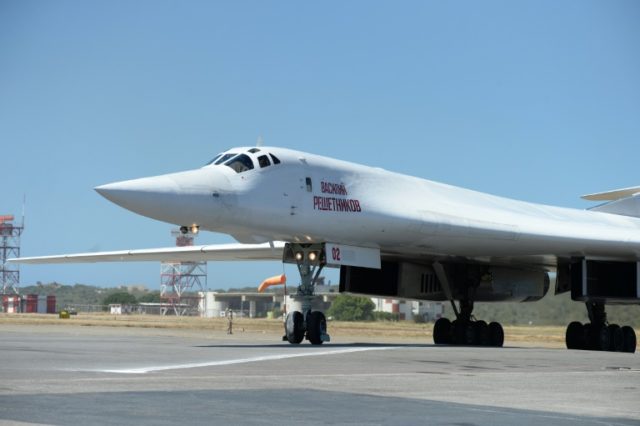The Russian Defense Ministry confirmed on Monday that it has placed two nuclear-capable Tupolev Tu-160 strategic bombers in Venezuelan territory, less than a week after Venezuelan dictator Nicolás Maduro paid a visit to Moscow to secure key investment in his regime.
“Two Tu-160 strategic bombers, an An-124 heavy military transport plane and an Il-62 long-haul plane of the Russian aerospace forces that took off from aerodromes in Russia have landed at the Maiquetía Simón Bolívar International Airport of the Venezuelan capital city,” the defense ministry said in a statement, according to Russia’s TASS news agency.
As the Venezuelan independent news outlet Runrunes notes, these bombers are nuclear capable, able to carry as many as 12 cruise missiles with nuclear or conventional warheads, according to NATO estimates. Moscow insisted that their arrival “occurred with strict conformity to the international norms regarding airspace travel.”
Venezuela: Arriban al país por Maiquetia, dos aviones militares de transporte (Antonov e Ilyushin) de la Fuerza Aérea Rusa. Aviones militares para transporte de tonelaje de carga y pasajeros #10dic pic.twitter.com/JrpM0IRpio
— Rocío San Miguel (@rociosanmiguel) December 10, 2018
The aircraft arrived a week after Maduro flew to Moscow to discuss financing his failed state with Russian President Vladimir Putin. Russia has been one of Venezuela’s most reliable sources of emergency income for years, typically in exchange for some of Venezuela’s vast oil reserves. Under Maduro, however, the socialist government has failed to efficiently extract and refine its oil, leaving the economy with little to offer the world.
Putin nonetheless issued his support to the regime at the Kremlin.
“We back your efforts aimed at achieving common ground in the society and your efforts designed to settle relations with the opposition,” Putin reportedly said. “Certainly, we condemn any terrorism-related steps and any attempts to change the situation using force.”
Maduro, in turn, promised the Venezuelan people that he had “found the way to advance with a complete, integral economic program that can be perfectly integrated into the Russian-Venezuelan economic vision.” He did not provide any details as to what this program would be, other than Venezuela allegedly receiving $6 billion worth of Russian investment for developing its oil and mineral economy. Maduro has proposed significantly expanding Venezuela’s gold mining to make up for losses in oil revenue, rather than spending on hiring staff for the state-run oil company capable extracting and refining the oil.
The lack of detail in Maduro’s plan, namely the detail of what Russia would receive in exchange for its generous donation to the socialist regime, suggests that there may perhaps be a relationship with Moscow’s newfound presence in South America and its trade deals with Caracas.
The United States condemned Russia’s weaponizing of the continent.
“The U.S.’s focus in the region differs from that of Russia,” Pentagon spokesman Col. Robert Manning told reporters. “In the midst of tragedy, Russia sends bombers to Venezuela while we send a hospital ship.”
The United States has attempted repeatedly to send humanitarian aid to Venezuela, but the Maduro regime has rejected all aid outside of that provided by China, claiming that no humanitarian crisis exists in the country. Human rights organizations, the United Nations, and global journalists have extensively documented famine in Venezuela as well as a near complete lack of access to medication. The U.S. Navy has succeeded in sending a ship to nearby Colombia tasked with providing medical aid to fleeing Venezuelan refugees.
Secretary of State Mike Pompeo also condemned the Russian move. “The peoples of Russia and Venezuela should see this for what it is: two corrupt governments wasting public funds and crushing liberty while their people suffer,” Pompeo said.
Kremlin spokesman Dmitry Peskov responded to Pompeo, calling his words “inappropriate” and “undiplomatic.”
Russia appears increasingly interested in a growing presence in Latin America, despite the continent’s turn rightward in the past three years. As Peskov responded to Pompeo, Russian intelligence chief Sergey Narishkin met with communist dictator Raúl Castro in Havana and his subordinate, President Miguel Díaz-Canel, to discuss intelligence-sharing and general cooperation. Like Maduro, Díaz-Canel also made a recent trip to Moscow, his occurring in November. According to the independent Cuban news outlet 14ymedio, the two sides did not specify what sorts of agreements they discussed.

COMMENTS
Please let us know if you're having issues with commenting.